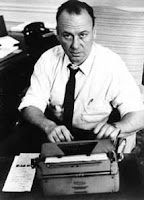On the 8th July 1889, the first issue of the Wall Street Journal appeared. Dow Jones & Compny, publisher of the Journal, was founded in 1882 by reporters Charles Dow, Edward Jones and Charles Bergstresser. Jones converted the small Customers' Afternoon Letter into the Wall Street Journal, first published in 1889, and began delivery of the Dow Jones News Service via telegraph. The Journal featured the Jones 'Average', the first of several indexes of stock and bond prices on the New York Stock Exchange.
 |
| Dow |
 |
| Jones |
 |
| Bergstresser |
 |
| Charles Barron |
Journalist Clarence Barron purchased control of the company for US$130,000 in 1902; circulation was then around 7,000 but climbed to 50,000 by the end of the 1920s. Barron and his predecessors were credited with creating an atmosphere of fearless, independent financial reporting—a novelty in the early days of business journalism.
Barron died in 1928, a year before Black Tuesday, the stock market crash that greatly effected the Great Depression in the United States. Barron's descendants, the Bancroft family, would continue to control the company until 2007.
 |
| Kilgore |
The Journal took its modern shape and prominence in the 1940s, a time of industrial expansion for the United States and its financial institutions in New York. Bernard Kilgore was named managing editor of the paper in 1941, and company CEO in 1945, eventually compiling a 25-year career as the head of the Journal. Kilgore was the architect of the paper's iconic front-page design, with its "What's News" digest, and its national distribution strategy, which brought the paper's circulation from 33,000 in 1941 to 1.1 million at the time of Kilgore's death in 1967. It was also on Kilgore's watch, in 1947, that the paper won its first Pulitzer Prize, for editorial writing.
The Wall Street Journal nevertheless fell on uncertain times in the 1990s, as declining advertising and rising newsprint costs—contributing to the first-ever annual loss at Dow Jones in 1997—raised speculation that the paper might have to drastically change, or be sold.
Unfortunately the paper was sold in 2007 to News Corp. the Rupert Murdoch empire. It was stated at the time:
“Mr. Murdoch told the Bancrofts that 'any interference – or even hint of interference – would break the trust that exists between the paper and its readers, something I am unwilling to countenance.' ... Mr. Murdoch and the Bancrofts agreed on standards modeled on the longstanding Dow Jones Code of Conduct.”
A June 5 Journal news story quoted charges that Murdoch had made and broken similar promises in the past. One large shareholder commented that Murdoch has long "expressed his personal, political and business biases through his newspapers and television stations." Journalist Fred Emery, formerly of the British newspaper The Times, recounted an incident when Murdoch was reminded of his own earlier promises not to fire The Times' editors without independent directors' approval and allegedly responded, "God, you don't take all that seriously, do you?"
This is the man who has been embarrassed into closing down the News of the World. The very idea that journalism can stoop so low as the operators of News of The World is, in my view, symptomatic of its top leadership. One can only wonder at the fate of the Wall Street Journal. As I am not a regular reader I can only wonder if it still maintains those qualities established during its history and the guidance of Bernard Kilgore. Probably not. Patrick Yau has a view of whats up:
No comments:
Post a Comment